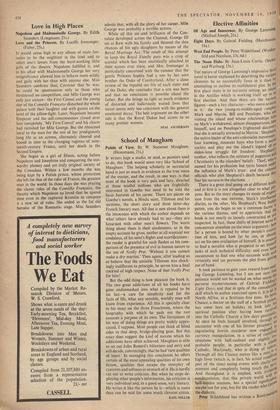Love in High Places
Napoleon and Mademoiselle George. By Edith Saunders. (Longmans, 21s.)
Love and the Princess. By Lucille Iremonger. (Faber, 25s.) IT would come high in any album of male fan- tasies to be the mightiest in the land and to select one's lovers from the hard-working little girls of the theatre. Napoleon fulfilled it, and in his affair with Mademoiselle George her very insignificance allowed him to behave more wildly and gaily with her than with anyone else. Miss Saunders confirms that, Corsican that he was, he could be spontaneous only to those who threatened no competition, and Mlle George was only just sixteen : the First Consul and the young star of the Comedie Francaise disturbed the whole palace with their'laughter and with games on the level of the pillow-fight. Later, Napoleon became Emperor and his self-consciousness closed over him completely. 'My First Consul' and his charm had vanished for Mlle George. But she remained loyal to the man for the rest of her prodigiously long life as an actress, alternately cheered and booed in time to the changing regimes of nine- teenth-century France, until her death in the Second Empire.
She began as a girl of fifteen, acting before Napoleon and Josephine and conquering the out- wardly phoney and yet truly original society of the Consulate. Within a few months she was being kept by a Polish prince, whose protection she left for that of the ruler of France, the greatest man in the world. In those days she was playing the classic roles of the Comedie Francaise, the theatre which Napoleon so loved that he spared time even in the captured Kremlin to compose it a new set of rules. She ended as the fat old heroine of the Romantic stage. Miss Saunders admits that, with all the glory of her career, Mlle George was probably a terrible actress.
While all this sin and brilliance of the Con- sulate developed across the Channel, George III sat at Kew with his family and thinned the thin chances of his ugly daughters by means of the Royal Marriage Act. The result of this attempt to keep the Royal Family pure was a crop of scandal which has been uncritically attached to their names ever since, and Mrs. Iremonger is particularly concerned with the rumour that the gentle Princess Sophia had a son by her own brother the Duke of Cumberland. After a close review of the reputed sex life of each sister and of the Duke, she concludes that a son was born and that no conclusion is possible about the father. But she brings to light so much evidence of distorted and ludicrously wasted lives that incest seems only too consistent with the general emotional decay. The best argument on the other side is that the Royal Dukes had access to so many prettier women.
NEAL ASCHERSON






































 Previous page
Previous page